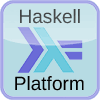Haskell Platform: Difference between revisions
DonStewart (talk | contribs) |
m (Changed link to haskell platform documentation - original link returned 404) |
||
| (107 intermediate revisions by 21 users not shown) | |||
| Line 1: | Line 1: | ||
{{HP}} | |||
The Haskell Platform | The Haskell Platform is a single, standard [[Haskell]] development environment for everyone. It offers a set of blessed libraries and tools, to save you the task of picking and choosing which core Haskell libraries to use. | ||
[http://haskell.org/platform/contents.html Learn more about the Haskell Platform ⇒] | |||
__TOC__ | |||
== What's in the platform == | |||
See the [https://www.haskell.org/downloads/#platform Haskell Platform documentation] on [https://www.haskell.org haskell.org]. | |||
== | == Trouble shooting == | ||
Report bugs on GitHub: | |||
[https://github.com/haskell/haskell-platform/issues Haskell Platform Issues]. | |||
=== Developers === | |||
* | * New [https://github.com/haskell/haskell-platform/wiki/ Haskell Platform Wiki] | ||
* | * Old [http://trac.haskell.org/haskell-platform/ Trac wiki] | ||
== | == Buttons == | ||
We have some buttons to let your friends know about the Haskell Platform. | |||
[http://haskell.org/platform http://raw.githubusercontent.com/haskell/haskell-platform/master/website/icons/button-100.png] | |||
Use this html in your site: | |||
<code> | |||
<nowiki> | |||
<a href="http://haskell.org/platform"> | |||
<img src="http://raw.githubusercontent.com/haskell/haskell-platform/master/website/icons/button-100.png"></a> | |||
</nowiki> | |||
</code> | |||
[http://haskell.org/platform http://raw.githubusercontent.com/haskell/haskell-platform/master/website/icons/button-64.png] | |||
Use this html in your site: | |||
<code> | |||
<nowiki> | |||
<a href="http://hackage.haskell.org/platform"> | |||
<img src="http://raw.githubusercontent.com/haskell/haskell-platform/master/website/icons/button-64.png"></a> | |||
</nowiki> | |||
</code> | |||
SVG source for the button: http://haskell.org/haskellwiki/Image:Button.svg | |||
=== Icons === | |||
Icons for the platform installer and desktop. | |||
[[Image:Platform-100.png]] | |||
[[Image:Platform-64.png]] | |||
=== Legal === | |||
* | * The cherry blossom image used in the 2011 HP release is [http://www.flickr.com/photos/28481088@N00/3291086383/ licensed CC by tanakawho] | ||
[[Category:HaskellPlatform]] | |||
[[Category: | |||
Latest revision as of 13:28, 21 January 2020
|
The Haskell Platform is a single, standard Haskell development environment for everyone. It offers a set of blessed libraries and tools, to save you the task of picking and choosing which core Haskell libraries to use.
Learn more about the Haskell Platform ⇒
What's in the platform
See the Haskell Platform documentation on haskell.org.
Trouble shooting
Report bugs on GitHub: Haskell Platform Issues.
Developers
- New Haskell Platform Wiki
- Old Trac wiki
Buttons
We have some buttons to let your friends know about the Haskell Platform.
http://raw.githubusercontent.com/haskell/haskell-platform/master/website/icons/button-100.png
Use this html in your site:
<a href="http://haskell.org/platform">
<img src="http://raw.githubusercontent.com/haskell/haskell-platform/master/website/icons/button-100.png"></a>
http://raw.githubusercontent.com/haskell/haskell-platform/master/website/icons/button-64.png
Use this html in your site:
<a href="http://hackage.haskell.org/platform">
<img src="http://raw.githubusercontent.com/haskell/haskell-platform/master/website/icons/button-64.png"></a>
SVG source for the button: http://haskell.org/haskellwiki/Image:Button.svg
Icons
Icons for the platform installer and desktop.
Legal
- The cherry blossom image used in the 2011 HP release is licensed CC by tanakawho

